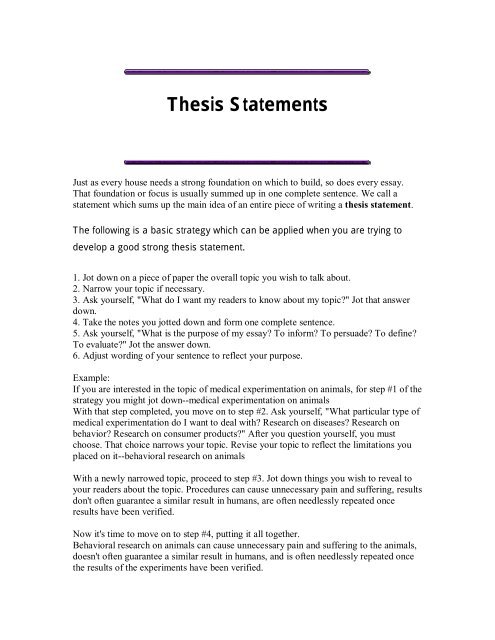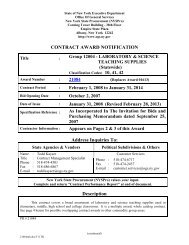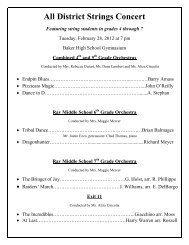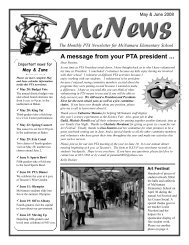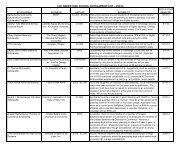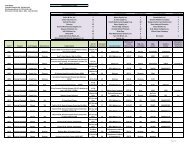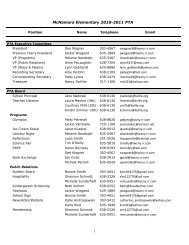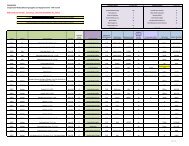Writing a good Thesis Statement
Writing a good Thesis Statement
Writing a good Thesis Statement
You also want an ePaper? Increase the reach of your titles
YUMPU automatically turns print PDFs into web optimized ePapers that Google loves.
<strong>Thesis</strong> <strong>Statement</strong>s<br />
Just as every house needs a strong foundation on which to build, so does every essay.<br />
That foundation or focus is usually summed up in one complete sentence. We call a<br />
statement which sums up the main idea of an entire piece of writing a thesis statement.<br />
The following is a basic strategy which can be applied when you are trying to<br />
develop a <strong>good</strong> strong thesis statement.<br />
1. Jot down on a piece of paper the overall topic you wish to talk about.<br />
2. Narrow your topic if necessary.<br />
3. Ask yourself, "What do I want my readers to know about my topic" Jot that answer<br />
down.<br />
4. Take the notes you jotted down and form one complete sentence.<br />
5. Ask yourself, "What is the purpose of my essay To inform To persuade To define<br />
To evaluate" Jot the answer down.<br />
6. Adjust wording of your sentence to reflect your purpose.<br />
Example:<br />
If you are interested in the topic of medical experimentation on animals, for step #1 of the<br />
strategy you might jot down--medical experimentation on animals<br />
With that step completed, you move on to step #2. Ask yourself, "What particular type of<br />
medical experimentation do I want to deal with Research on diseases Research on<br />
behavior Research on consumer products" After you question yourself, you must<br />
choose. That choice narrows your topic. Revise your topic to reflect the limitations you<br />
placed on it--behavioral research on animals<br />
With a newly narrowed topic, proceed to step #3. Jot down things you wish to reveal to<br />
your readers about the topic. Procedures can cause unnecessary pain and suffering, results<br />
don't often guarantee a similar result in humans, are often needlessly repeated once<br />
results have been verified.<br />
Now it's time to move on to step #4, putting it all together.<br />
Behavioral research on animals can cause unnecessary pain and suffering to the animals,<br />
doesn't often guarantee a similar result in humans, and is often needlessly repeated once<br />
the results of the experiments have been verified.
Bingo! You have a dynamite thesis for a research paper!<br />
Don't forget steps #5 & #6 though: what's your purpose to inform to persuade<br />
Informative statements deal with factual information and avoid emotionally charged<br />
descriptive words<br />
Persuasive statements combine factual information with emotionally charged language<br />
in an attempt to get the reader to agree with the writer's point of view.<br />
If our purpose is to persuade, the thesis statement we wrote in step #4 is fine because it<br />
contains emotionally charged language (i.e.. unnecessary, suffering, and needlessly)<br />
If our purpose is to inform, we would need to eliminate the emotionally charged language<br />
to conform with our intent.<br />
Also, remember...just as we needed to narrow our topic, we might also want to narrow<br />
the points we would like to relate to our readers if we are writing a short essay. For<br />
example, any one of the three points we covered in our research paper thesis statement<br />
could make a <strong>good</strong> thesis statement for a shorter essay.<br />
For more <strong>good</strong> advice, check out the<br />
Maple Woods Online <strong>Writing</strong> Center


